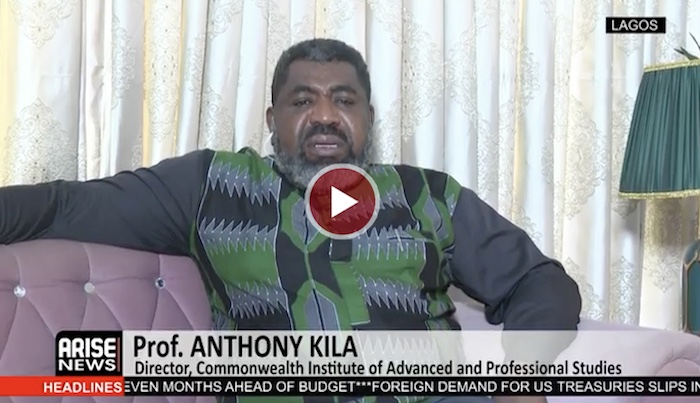
Professor Anthony Kila, Director of the Commonwealth Institute of Advanced and Professional Studies, has sharply criticised the escalating disorder within Nigeria’s opposition politics and the growing dysfunction in the country’s judicial system.
Speaking during an interview on ARISE News on Wednesday, Kila said the recent turmoil in the Peoples Democratic Party (PDP) illustrates a deeper national decay in political culture, leadership behaviour, and institutional integrity.
Kila said the crisis within the PDP marked by clashes, factional struggles and public confrontations was not an isolated occurrence but a symptom of a wider collapse of civility in Nigerian politics. Describing Tuesday’s events as a complete breakdown of order, he stated: “What we saw yesterday is a show of shame in terms of the form of the process.”
The professor explained that a viable opposition is crucial for democracy, insisting that those who cherish democratic institutions must be alarmed by the ongoing disintegration of political parties. According to him, “those who respect institutions and love democracy… will understand that the legitimacy of the government in power stems not just from votes or performance, but also from a viable opposition.”
He warned that internal divisions within political parties are being fuelled not by ideological differences but by personal interests and opportunism. “These are people who are shouting and shoving and resorting to expanding and fighting each other… it shows you they’re not like-minded… they’re not peers. They’re people who are there to work.”
Kila added that what is playing out in the PDP could happen to any party because the entire political class suffers from the same lack of discipline and ideas. He faulted politicians for prioritising personality battles over policy alternatives, stating: “Our politicians have taken the short cut. Instead of providing ideas, they are providing validity. Instead of providing an alternative, they are providing conspiracy and backstabbing.”
Lamenting the deteriorating state of governance, he declared that the country’s political class does not deserve to be taken seriously. “Those are a bunch of clowns in here,” he said, describing the actions of many actors as unbecoming and uninspiring.
Beyond opposition politics, Kila issued a sweeping critique of the judiciary, insisting that the bench and the bar have become entangled in partisan activities. He stated emphatically: “In this regard, the judiciary is also part of the mess.”
He condemned the behaviour of senior judges at a recent judicial conference, calling their involvement in partisan gestures “shameful.” He said: “My name is Anthony Kila and I say shame. Shame on all those… disgracing Nigeria and disgracing what we call leadership that does not give children what to aspire to.”
Kila warned that politics corrupts institutions when boundaries collapse, stressing: “Partisan politics in general, and particularly in Nigeria, corrodes, corrupts, intoxicates, and mutilates.”
He called for urgent measures to restore the integrity of the judiciary, including technological reforms to eliminate case shopping. Offering a practical solution, he said: “I can donate an app in which all the cases will be entered… anything after that is a travesty of justice.”
The scholar argued that the burden of rescuing Nigeria’s democratic system lies with those in opposition, not the government, saying: “It is not the body of the president or the body of the government, it is the body of those who are in opposition, to present a platform… to show them that there is a viable alternative.”
He concluded with a warning that Nigeria’s democratic generation is now confronted with a defining struggle: “This is the battle for this generation of democracy.”
Faridah Abdulkadiri



